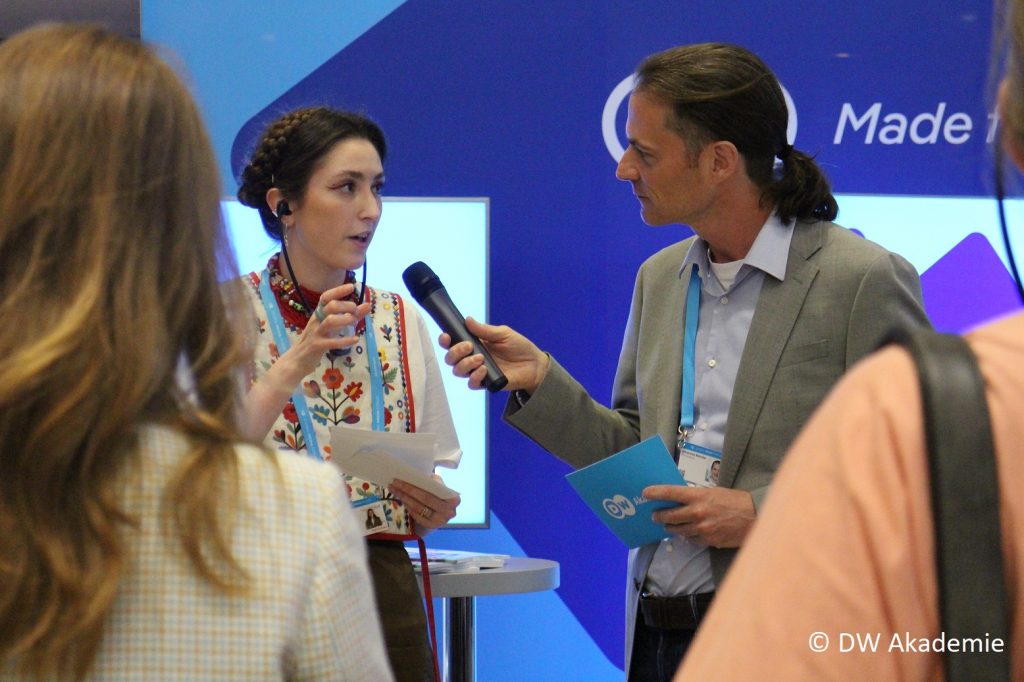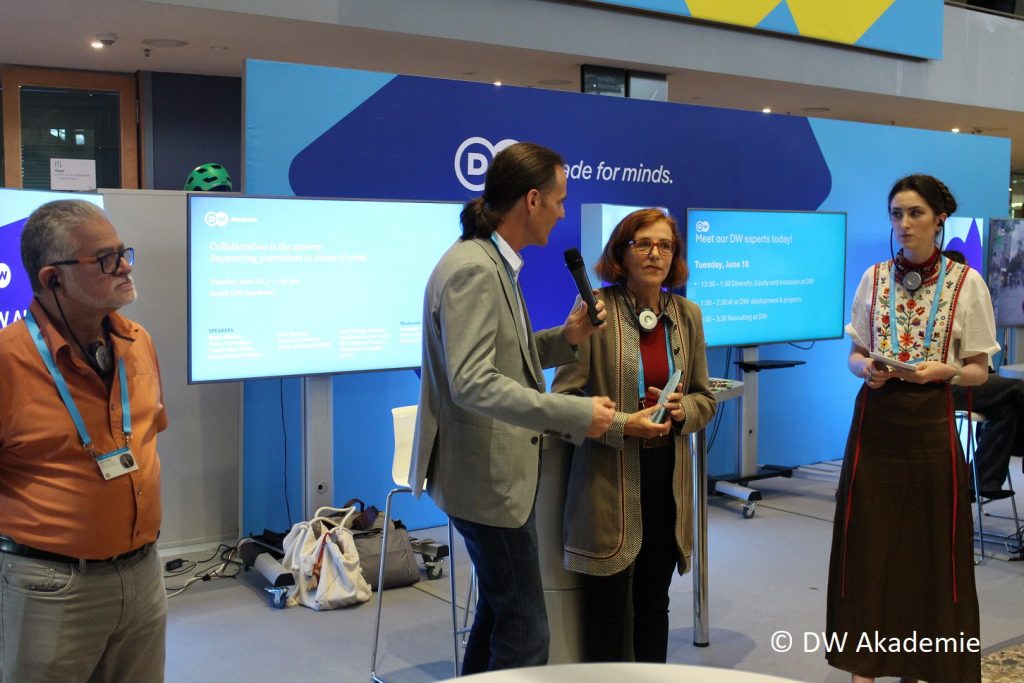The Hannah Arendt Initiative at the Global Media Forum 2024
Fast, flexible, coordinated: Providing support for media professionals under threat
At Deutsche Welle’s 2024 Global Media Forum in Bonn, the Hannah Arendt Initiative presented its approaches to protecting media professionals worldwide. A panel discussion provided concrete insights into how a network partner and a local partner organization support journalists under threat, such as in war zones or in exile.

Picture: Johannes Metzler [right], moderator of the discussion at the GMF and head of the „Strategic Initiatives“ department at DW Akademie in conversation with Olha Syrotiuk from „Voices of Ukraine“ (ECPMF)
At the GMF, Olha Syrotiuk described the extreme dangers and challenges faced by participants in the protection program for Ukrainian journalists. She coordinates the „Voices of Ukraine“ program at the European Center for Press and Media Freedom (ECPMF), one of the partners of the Hannah Arendt Initiative:
In the two years and three months since the start of the major war of aggression, Russia has committed 599 crimes against journalists and the media in Ukraine. More than 200 media outlets have been closed. More than ten journalists have died while reporting and 72 have been killed – in combat, under Russian fire or under torture.
Olha Syrotiuk, ECPMF
Syrotiuk went on to emphasize: „Even if the journalists are not working in the immediate vicinity of the front line, they are still in an active war zone. We need to support journalists who are under enormous pressure so that independent media can continue to share important information.“
According to a needs survey conducted by the Ukrainian non-governmental organization The Institute of Mass Information, almost 39% of Ukrainian journalists say they need technical equipment, as their laptops and cameras can be lost from one minute to the next. They also need help with power supplies. According to Syrotiuk, financial help is a must and there continues to be a desire for training and learning opportunities. „There is also a need for more workspace, help with improving security and psychological support,“ said the coordinator of the protection program.
ECPMF works closely with six Ukrainian organizations on the ground in order to flexibly tailor its support services to the needs of journalists.
„Our ‚Voices of Ukraine’ program supports media workers with financial and technical emergency aid, with insurance for journalists on the front line,” said Syrotiuk. “We have residences in Ukraine and Kosovo where media professionals can temporarily get some distance from their work and recharge their batteries. We offer training opportunities, support with publications and provide special opportunities for women.“ Their approaches are all focused on improving the living and working conditions of journalists.
A house for independent journalism in Costa Rica
On the other side of the globe, in Costa Rica, network partner DW Akademie is preparing a new project, which relies on both Instituto de Prensa y Libertad de Expresión (IPLEX) and media professionals in the country. The idea of setting up a single contact point for exile media is currently taking shape.
Raúl Silesky Jiménez, President and co-founder of IPLEX, explained to the GMF guests:
The ‚casa para el periodismo libre‘ will open in July. The house will be open to exiled journalists from all over the region, offering them a range of support services. For example, there are currently 30 Nicaraguan media houses working out of Costa Rica, where it is still safe for them.
Raúl Silesky Jiménez, IPLEX
The house is intended to bundle offers from several donors. „We are in close contact with various other organizations that support media in exile: UNESCO, the Reuters Foundation, Free Press Unlimited, the Universidad de Costa Rica and others,” said Silesky.
DW Akademie plans to offer legal and psychological counseling and training, especially for female journalists. The new House for Independent Journalism will also offer exiled journalists the opportunity to work there and network with colleagues who find themselves in a similar situation.

Picture: The participants in the discussion at the Hannah Arendt Initiative mini-table [from left to right]: Raúl Silesky Jiménez (IPLEX), Johannes Metzler (DW Akademie), Beate Weides (Hannah Arendt Initiative), Olha Syrotiuk (ECPMF)
Offers from other network partners of the Hannah Arendt Initiative
Beate Weides went on to complete the picture of the Hannah Arendt Initiative for GMF attendees. She manages the coordination office of the Hannah Arendt Initiative, such as with the network partners Media in Cooperation and Transition (MiCT) and the European JX Fund, who are also part of the initiative. MiCT offers a scholarship program for journalists under threat and recently opened an Exile Media Hub in Nairobi. The JX Fund helps exiled media to resume their work in exile in Germany.
What has the Hannah Arendt Initiative achieved so far? Beate Weides explained:
Since the initiative was launched in the Fall of 2022, it has helped more than 5,000 journalists and almost 60 media organizations. The partners and the two German ministries regularly exchange information about their work and the latest developments. This enables them to react quickly if the security situation for the media in a country or region deteriorates, as is currently the case in Georgia. The need is great, the number of countries in which media freedom is being lost is growing – and the threats are manifold.
Beate Weides, Hannah Arendt Initiative
(BW)